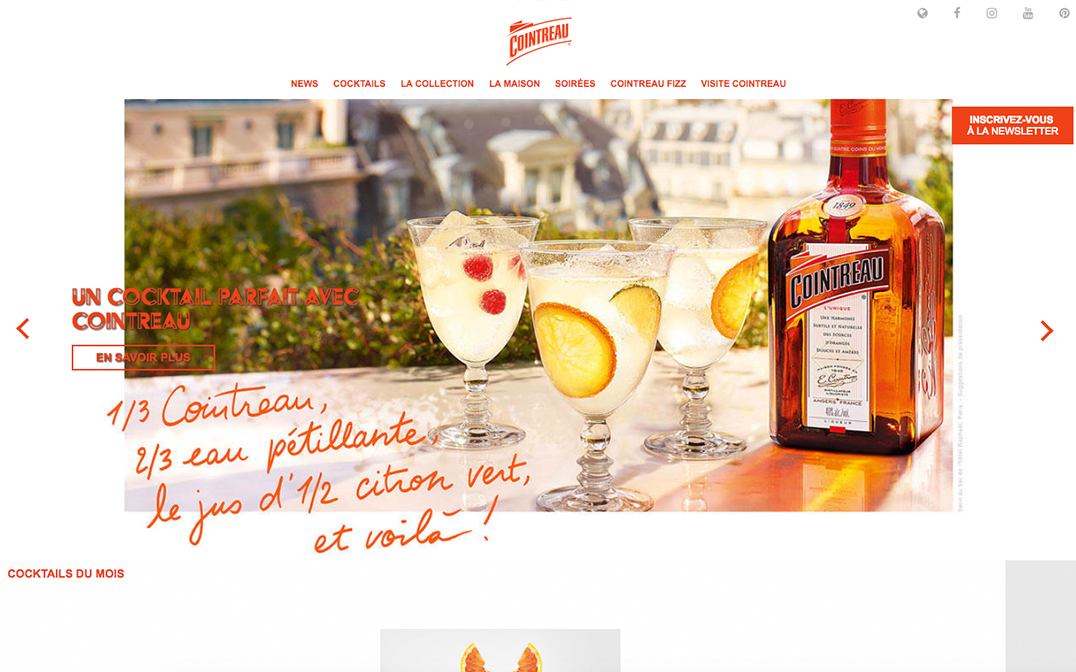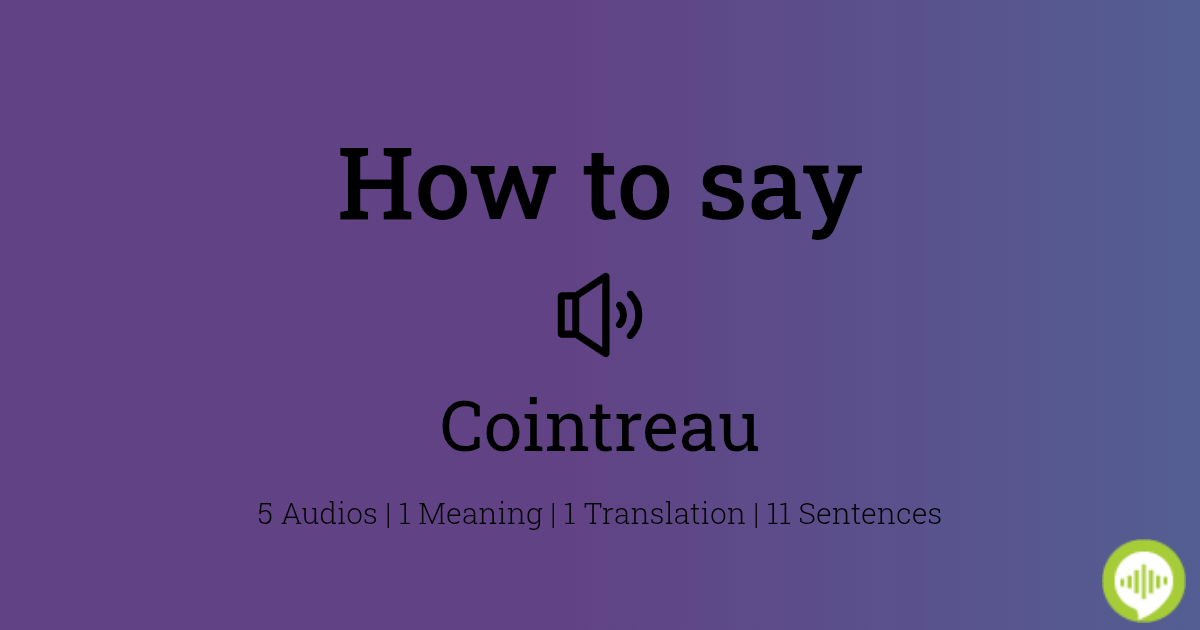How To Pronounce Cointreau: A Comprehensive Guide For Liquor Lovers
Have you ever found yourself standing in front of the liquor shelf at your local store, staring at that elegant bottle of Cointreau, but hesitating because you're not sure how to pronounce it? Don’t worry—you're definitely not alone. Cointreau is one of those iconic orange liqueurs that sounds fancy but can leave even the most confident drink connoisseurs stumbling over its pronunciation. But hey, no judgment here! Let’s dive into the world of Cointreau together and make sure you sound like a pro the next time you order it.
Let’s face it, pronouncing foreign words or brand names can be a bit intimidating. Especially when it comes to spirits like Cointreau, which has a rich history and a reputation for being a key ingredient in classic cocktails like Margaritas and Cosmopolitans. But fear not, my friend, because by the end of this article, you'll be saying it with confidence—whether you're at a bar or hosting your own cocktail party.
Before we get into the nitty-gritty of how to pronounce Cointreau, let’s set the mood. Picture yourself at a bustling bar in Paris, surrounded by the clinking of glasses and the hum of lively conversation. Now, imagine ordering a refreshing cocktail with a perfectly pronounced “Cointreau.” Sounds pretty cool, right? So, let’s get started!
Read also:All Roads Theatre Company A Journey Through Passion And Performance
Table of Contents:
- The History of Cointreau
- How to Pronounce Cointreau
- Common Pronunciation Mistakes
- Tips for Perfect Pronunciation
- Cointreau in Popular Cocktails
- Alternative Pronunciations Around the World
- Tips for Enjoying Cointreau
- Myths About Cointreau Pronunciation
- Famous Fans of Cointreau
- Conclusion: Say It Like a Pro
The History of Cointreau
Alright, before we dive into the pronunciation, let’s take a quick trip down memory lane to understand where Cointreau comes from. Cointreau was first created in 1849 by the Cointreau brothers, Edouard-Jean and Adolphe Cointreau, in Angers, France. They were inspired by the vibrant flavors of orange and decided to create a liqueur that would stand out in the world of spirits. And boy, did they succeed!
This crystal-clear liqueur is made using a blend of sweet and bitter orange peels, along with a secret recipe of spices and herbs. It’s been a staple in cocktail culture ever since, and its distinct flavor profile makes it a favorite among bartenders and cocktail enthusiasts alike.
How to Pronounce Cointreau
Now, let’s get to the heart of the matter—how do you actually pronounce Cointreau? The correct pronunciation is kwahn-TROH. Easy, right? But here’s the thing—many people get tripped up because they try to pronounce it like an English word, and that’s where the trouble starts.
To break it down further:
- “Coint” sounds like “kwahn” (rhymes with “on”).
- “reau” sounds like “troh” (rhymes with “go”).
It’s all about that soft “r” sound and the emphasis on the second syllable. Practice saying it a few times, and you’ll get the hang of it in no time.
Read also:Procollagen Vital Essence Collagen The Secret To Glowing Skin And Radiant Health
Common Pronunciation Mistakes
Let’s talk about some of the most common mistakes people make when pronouncing Cointreau. First up, the dreaded “Coint-ROH.” This is a classic error where people try to force an English pronunciation on a French word. Trust me, it doesn’t work.
Another common mistake is overemphasizing the “r” sound, making it sound more like “Coint-RAH.” While it might sound dramatic, it’s not quite right. Remember, the French “r” is softer and more subtle.
Tips for Perfect Pronunciation
Ready to nail that pronunciation? Here are a few tips to help you out:
- Listen to native French speakers pronounce it. YouTube and pronunciation apps can be great resources.
- Practice saying it slowly at first. Break it down into syllables and focus on the sounds.
- Use tongue twisters to get your mouth used to the sounds. Try saying “Cointreau cocktail” a few times!
- Don’t be afraid to ask for help. Bartenders and fellow cocktail lovers are usually happy to lend a hand.
Cointreau in Popular Cocktails
Now that you know how to pronounce it, let’s talk about why Cointreau is such a big deal in the cocktail world. This liqueur is a key ingredient in some of the most iconic drinks out there. Here are a few classics you should definitely try:
- Margarita: A perfect balance of tequila, lime juice, and Cointreau.
- Cosmopolitan: The drink that made Cointreau famous in the 90s.
- White Lady: A sophisticated mix of gin, Cointreau, and lemon juice.
- Sidecar: A classic cocktail with brandy, Cointreau, and lemon juice.
These cocktails showcase the versatility of Cointreau and its ability to enhance a wide range of flavors.
Alternative Pronunciations Around the World
While the correct pronunciation is “kwahn-TROH,” it’s worth noting that different regions might have their own variations. In some English-speaking countries, you might hear people say “Coint-TROW,” which is a bit closer to the English pronunciation. However, if you’re in France or among cocktail enthusiasts, sticking to the original French pronunciation is always the way to go.
Tips for Enjoying Cointreau
Now that you know how to pronounce it, let’s talk about how to enjoy it. Cointreau can be enjoyed in a variety of ways:
- Straight up: Pour a small amount into a glass and savor the rich, citrusy flavors.
- On the rocks: Add a few ice cubes to chill it down without diluting the flavor too much.
- Mixed drinks: Use it as a base for your favorite cocktails or experiment with new recipes.
Remember, Cointreau is all about balance. Whether you’re sipping it neat or mixing it into a cocktail, the key is to let its flavors shine through.
Myths About Cointreau Pronunciation
There are a few myths floating around about how to pronounce Cointreau, and it’s time to set the record straight. One common myth is that it’s pronounced “Coint-ROW,” which, as we’ve already discussed, is not correct. Another myth is that the “r” should be rolled like in Spanish, but that’s not accurate either. The French “r” is softer and more subtle.
So, next time someone tells you they know how to pronounce it, double-check with a trusted source. And remember, it’s always better to ask than to assume!
Famous Fans of Cointreau
Cointreau has been a favorite among celebrities and influencers for years. From bartenders to chefs, many have spoken about their love for this versatile liqueur. Here’s a quick look at some famous fans:
- Daniel Humm: The renowned chef and owner of Eleven Madison Park is a big fan of Cointreau in his cocktail creations.
- David Wondrich: A respected cocktail historian who often highlights Cointreau’s role in classic cocktails.
- Shake Shack: Known for using Cointreau in their signature Margarita.
These names are just the tip of the iceberg when it comes to Cointreau’s influence in the culinary and cocktail worlds.
Bio of Cointreau
Here’s a quick look at the brand:
| Founder | Edouard-Jean and Adolphe Cointreau |
|---|---|
| Year Founded | 1849 |
| Country | France |
| Key Ingredients | Sweet and bitter orange peels, spices, herbs |
| Alcohol Content | 40% |
Conclusion: Say It Like a Pro
Well, there you have it—everything you need to know about how to pronounce Cointreau. From its rich history to its role in classic cocktails, Cointreau is more than just a liqueur—it’s a symbol of sophistication and flavor. So, the next time you’re at a bar or hosting a party, don’t hesitate to order a drink with Cointreau and say it with confidence: kwahn-TROH.
And remember, practice makes perfect. Whether you’re practicing at home or asking a bartender for guidance, the key is to have fun with it. After all, enjoying a good drink is all about the experience.
So, what are you waiting for? Grab a bottle, pour yourself a drink, and start practicing that pronunciation. Cheers to sounding like a pro and enjoying one of the finest liqueurs in the world!
Don’t forget to leave a comment below and share your favorite Cointreau cocktail. And if you found this article helpful, feel free to share it with your friends. Let’s spread the love for Cointreau—one perfectly pronounced word at a time!
Article Recommendations


